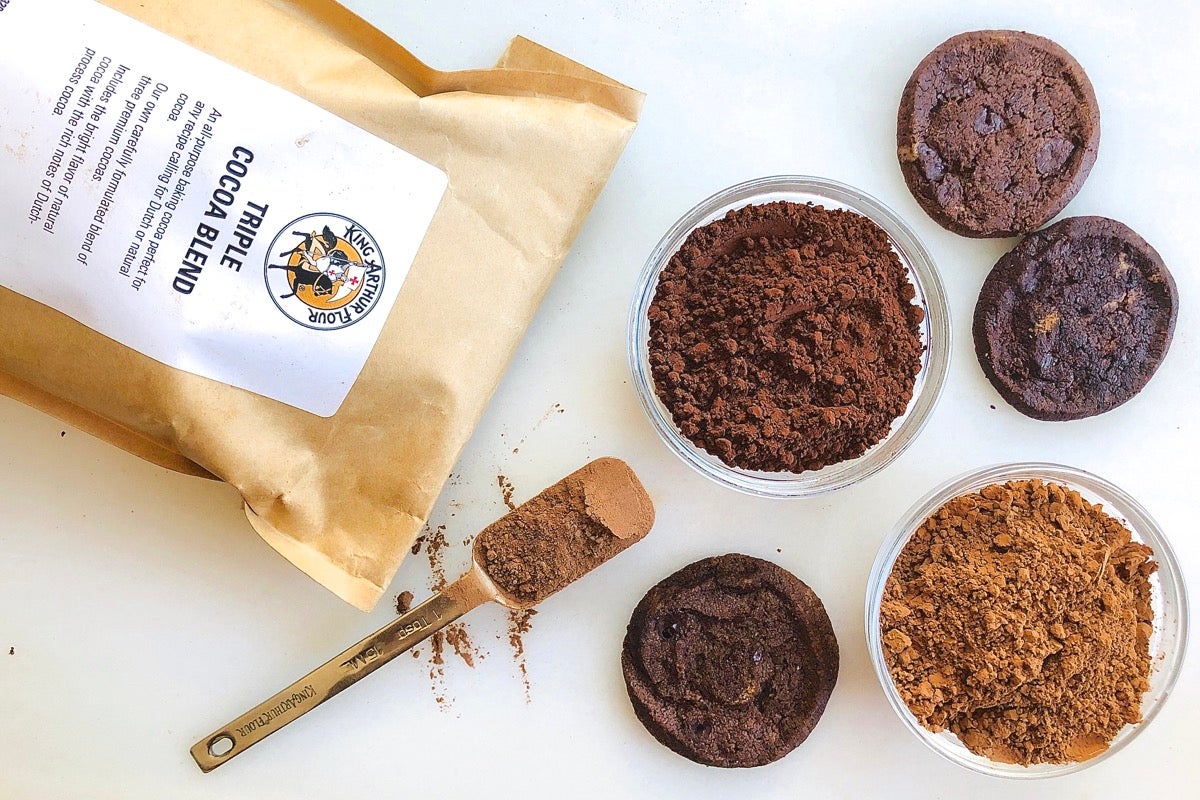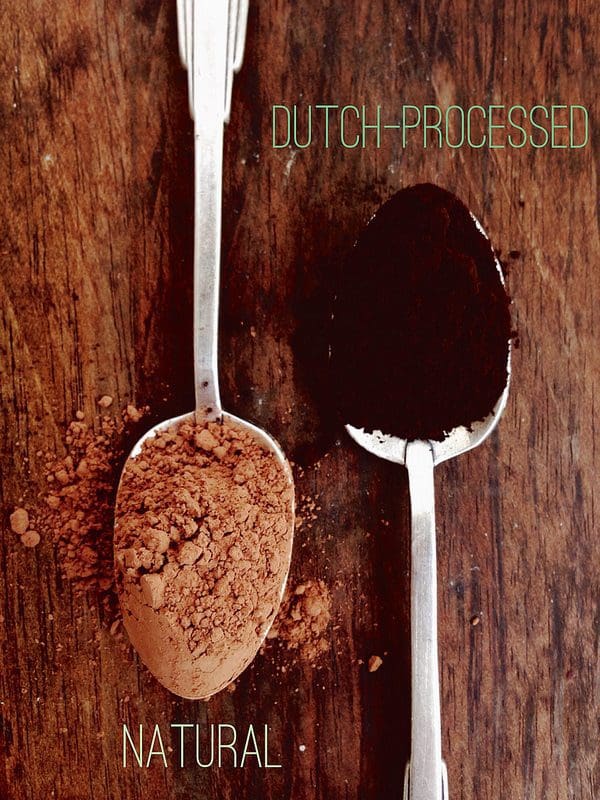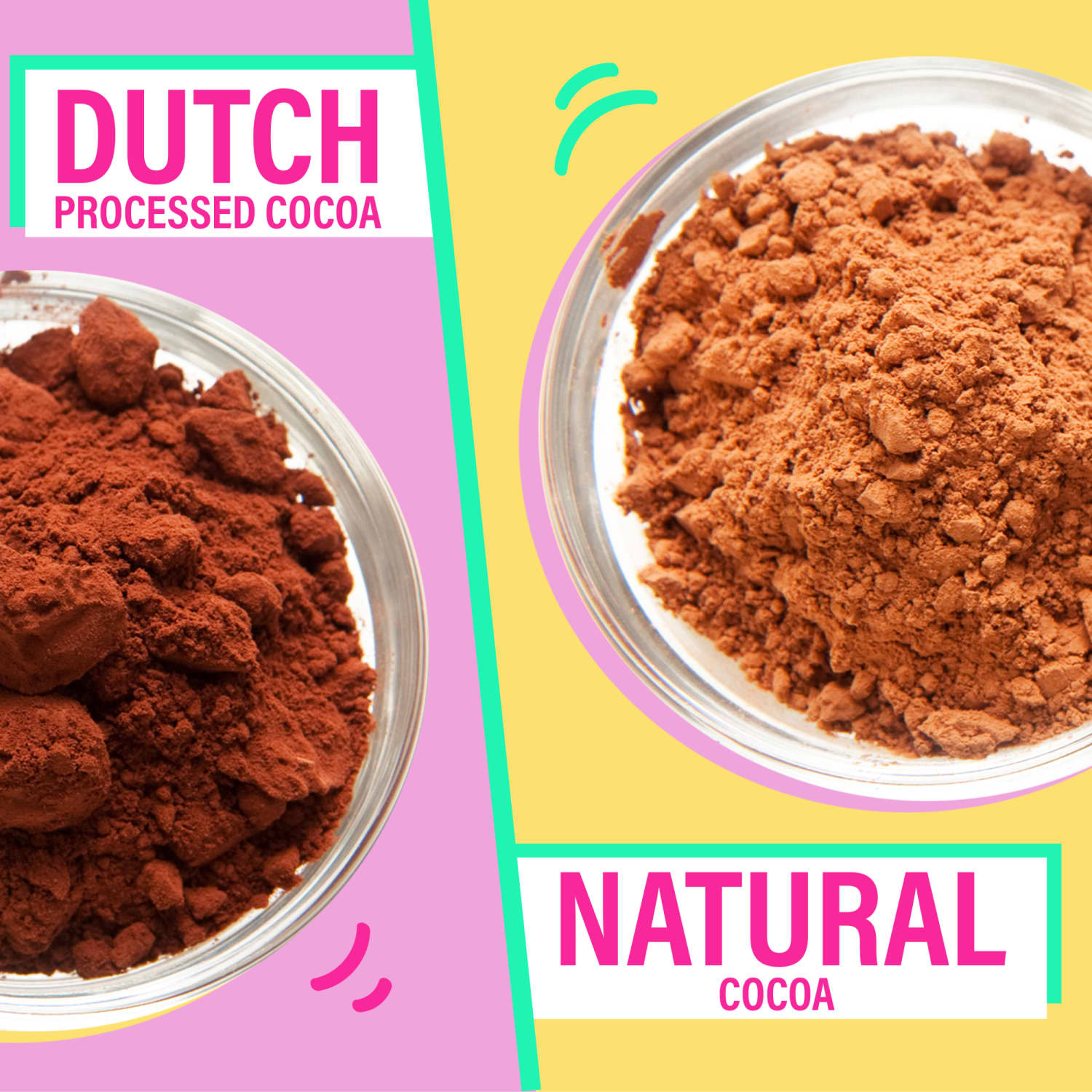Do you use baking soda with Dutch process cocoa. Novedad aquí - Do you use baking soda or baking powder with Dutch-process cocoa
 Since Dutch process cocoa isn't acidic, it doesn't react with alkaline leaveners like baking soda to produce carbon dioxide. That's why recipes that use Dutch process cocoa are usually leavened by baking powder, which has a neutral pH.
Since Dutch process cocoa isn't acidic, it doesn't react with alkaline leaveners like baking soda to produce carbon dioxide. That's why recipes that use Dutch process cocoa are usually leavened by baking powder, which has a neutral pH.Dutch-process cocoa powder starts with cocoa beans that have been washed in alkaline solution of potassium carbonate. This wash neutralizes their acidity. So, dutch-process cocoa powder is neutral. Because it is neutral, it does not react with baking soda.
Unsweetened Cocoa Powder and Baking Soda Then, knock back the acidity by adding 1/8 teaspoon of baking soda for every 3 tablespoons of cocoa powder used. By adding baking soda to unsweetened cocoa, you are neutralizing the acid in the cocoa, so it doesn't interact unfavorably with the other ingredients in the recipe.
Natural cocoa powder is made from cocoa beans that are roasted and then ground into a fine powder after most of the fat is removed. Natural cocoa powder is acidic and often paired with baking soda (an alkali) in recipes to balance the flavor and create carbon dioxide bubbles that help baked goods rise in the oven.
Does it matter if I use baking powder or baking soda
When to use which one. Baking soda is used in recipes that also include an acidic ingredient, such as cream of tartar, buttermilk, or citrus juice. Conversely, baking powder is typically used when the recipe doesn't feature an acidic ingredient, as the powder already includes the acid needed to produce carbon dioxide.Does Dutch processed cocoa taste different
The process gives the powder a darker color and a smoother, softer flavor. Dutch cocoa is also not quite as chocolaty as natural cocoa. It's milder overall (but still tasty).Things You Should Never Clean With Baking Soda1) Antique silver. Although baking soda can pretty quickly remove tarnish from silverware, it doesn't necessarily mean it's a good idea to use it.2) Marble.3) Ceramic cooktop.4) Aluminum.5) Gold-plated items.
In general, natural cocoa offers mild, light flavor (some call it “old-fashioned chocolate flavor”) while Dutch-process will give you a darker, more bittersweet experience. These days it seems like most people's taste tends to dark chocolate, and the darker the better.What makes Dutch processed cocoa different
Dutch-processed cocoa powder (also referred to as Dutched chocolate, European-style or alkalized) is made from beans that have been washed with an alkaline solution that neutralizes that natural acidity and raises their pH to closer to seven. The process gives the powder a darker color and a smoother, softer flavor.
Alkali-processed “dutched” cocoa is not as healthy (See Update on Chocolate for the graph and Healthiest Chocolate Fix for some other chocolate comparisons). Dutched cocoa can have as few as half the phytonutrients, but that just means you have to use twice as much!
Many recipes need both kinds of reactions to achieve the intended overall balance of flavor and texture, which is why you'll often see both baking soda and baking powder in a recipe. Even though the ingredients are both adding air during the baking process, they're complements, not substitutes.If you're out of both baking soda and baking powder, self-rising flour might be a good alternative. Self-rising flour combines all-purpose flour, baking powder and salt, so it contains everything you need to help baked goods rise.
Alkali-processed “dutched” cocoa is not as healthy (See Update on Chocolate for the graph and Healthiest Chocolate Fix for some other chocolate comparisons). Dutched cocoa can have as few as half the phytonutrients, but that just means you have to use twice as much!In many recipes, cocoa types are interchangeable The good news is, most recipes from a reliable source will call for “unsweetened cocoa, Dutch-process, or natural.” So whichever cocoa you have, you're good to go: all cocoas are either natural or Dutch-process, so either one will work.
Why should you avoid baking soda
Baking soda contains sodium, which, in high amounts, can affect the heart. One 2016 case study notes that overdosing on baking soda has caused heart arrhythmias for some individuals. There have also been cases of baking soda overdoses causing cardiac arrest.Using too much baking soda or baking powder can really mess up a recipe, causing it to rise uncontrollably and taste terrible.Alkali-processed “dutched” cocoa is not as healthy (See Update on Chocolate for the graph and Healthiest Chocolate Fix for some other chocolate comparisons). Dutched cocoa can have as few as half the phytonutrients, but that just means you have to use twice as much!In many recipes, cocoa types are interchangeable The good news is, most recipes from a reliable source will call for “unsweetened cocoa, Dutch-process, or natural.” So whichever cocoa you have, you're good to go: all cocoas are either natural or Dutch-process, so either one will work.Dutch-processed cocoa, which is also called Dutched-chocolate, is made by treating the natural cocoa powder with an alkalizing agent to bring the pH to 7, which is neutral. This gives the cocoa a smoother flavor and darker color, ideal for drinking.
Does it matter if you use baking soda instead of baking powder
If you swap in an equal amount of baking soda for baking powder in your baked goods, they won't have any lift to them, and your pancakes will be flatter than, well, pancakes. You can, however, make a baking powder substitute by using baking soda.Why do some recipes call for both Some recipes call for both baking powder and baking soda. These recipes contain some sort of acid (yogurt, brown sugar, etc), however the carbon dioxide created from the acid and baking soda is not enough to leaven the volume of batter in the recipe.
Dutch-processed cocoa powder (also referred to as Dutched chocolate, European-style or alkalized) is made from beans that have been washed with an alkaline solution that neutralizes that natural acidity and raises their pH to closer to seven. The process gives the powder a darker color and a smoother, softer flavor.
In many recipes, cocoa types are interchangeable The good news is, most recipes from a reliable source will call for “unsweetened cocoa, Dutch-process, or natural.” So whichever cocoa you have, you're good to go: all cocoas are either natural or Dutch-process, so either one will work.To replace the Dutch-process cocoa powder called for in your recipe, use the same amount of natural unsweetened cocoa. Then, neutralize the acidity of the natural cocoa by adding 1/8 teaspoon of baking soda (a base) for every three Tablespoons of cocoa used.:max_bytes(150000):strip_icc()/__opt__aboutcom__coeus__resources__content_migration__serious_eats__seriouseats.com__images__2014__07__20140729-baking-chocolate-vicky-wasik-6-5f6197c5889547b1bfd68c703fc0a08d.jpg) You technically can leave out baking soda in certain recipes (like chocolate chip cookies or pancakes) in a pinch, but you need to understand that your finished product will not be as light and fluffy as the recipe intended. Unless you have no other option, you really should use a leavening substitute.
You technically can leave out baking soda in certain recipes (like chocolate chip cookies or pancakes) in a pinch, but you need to understand that your finished product will not be as light and fluffy as the recipe intended. Unless you have no other option, you really should use a leavening substitute.
Similar articles
- ¿Cuánto mide y pesa Kanté. Novedad aquí - ¿Cuánto mide y pesa Kante
- ¿Cuáles son los mejores plumones escolares. Novedad aquí - ¿Qué marca de plumones es la mejor
- ¿Qué capacidades físicas trabaja un jugador de balonmano. Novedad aquí - ¿Qué características fisicas debe tener un jugador de balonmano
- ¿Cuánto gana el subcampeón de la Premier League. Novedad aquí - ¿Cuánto gana el subcampeon de la Premier League
- ¿Cuándo es el final dela Copa del Rey. Novedad aquí - ¿Cuándo se jugará la final de la Copa del Rey 2022
- ¿Dónde veo Chivas Pachuca. Novedad aquí - ¿Dónde van a transmitir el partido de Chivas hoy
- ¿Cómo quedó el Barcelona ante el Rayo Vallecano. Novedad aquí - ¿Cómo quedó el Barça contra el Rayo Vallecano
- ¿Cómo se le dice al Espanyol. Novedad aquí - ¿Cómo le dicen al Espanyol de Barcelona
- ¿Quién tiene más hinchas Flamengo o Fluminense. Novedad aquí - ¿Cuántos hinchas tiene el Fluminense
- ¿Cuántos ascensos hay en Uruguay. Novedad aquí - ¿Cuántos equipos ascienden a Primera en Uruguay
- ¿Cuánto quedó el Barcelona en Europa League. Novedad aquí - ¿Cómo quedó el Barcelona por la Europa League
- ¿Dónde ver las estadisticas de los partidos de futbol. Novedad aquí - ¿Dónde ver estadísticas de equipos
- ¿Qué canal transmite la París-Niza Colombia. Novedad aquí - ¿Quién transmite París Niza hoy
- ¿Cuánto pagan por ser crupier. Novedad aquí - ¿Cuánto dinero gana un crupier
- ¿Cuánto es lo máximo que te puede prestar Kueski. Novedad aquí - ¿Cuánto es lo más que presta Kueski
Popular articles
- ¿Cuántos Grand Slam ha ganado Zverev. Novedad aquí - ¿Cuántos Grands Slams tiene Zverev
- ¿Quién tiene más dinero Brad Pitt o Leonardo DiCaprio. Novedad aquí - ¿Quién cobra más Leonardo DiCaprio o Brad Pitt
- ¿Cuándo se cierra Progol. Novedad aquí - ¿Qué pasa si tengo 7 aciertos en Progol
- ¿Cómo tributan las ganancias del juego. Novedad aquí - ¿Cómo tributan las ganancias del juego online
- ¿Dónde ver el Pumas vs León. Novedad aquí - ¿Dónde puedo ver el juego de Pumas hoy
- ¿Cómo anduvo el Betis con el Sevilla. Novedad aquí - ¿Cómo anduvo el Betis hoy
- ¿Cómo calcular un premio de quiniela. Novedad aquí - ¿Cómo se calcula el premio de la Quiniela
- ¿Dónde ver al Real Oviedo en México. Novedad aquí - ¿Dónde se puede ver el partido del Real Oviedo
- ¿Quién vendra a la Feria Durango 2022. Novedad aquí - ¿Qué cantantes van a estar en la Feria de Durango 2022
- ¿Qué pasa si Real Madrid empata con Liverpool. Novedad aquí - ¿Qué pasa si empata Liverpool y Real Madrid
- ¿Cuándo juega Badosa Indian Wells 2022. Novedad aquí - ¿Cuándo juega Paula Badosa en Indian Wells 2022
- ¿Quién ganó ayer en el US Open. Novedad aquí - ¿Qué hizo ayer Carlos Alcaraz
- ¿Qué problemas existen en Tampico. Novedad aquí - ¿Que tiene Tampico
- ¿Qué significa 4 sets en el gym. Novedad aquí - ¿Qué es 1 set en ejercicio
- ¿Quién tiene más goles de penal en la historia. Novedad aquí - ¿Quién es el jugador con más goles de penal